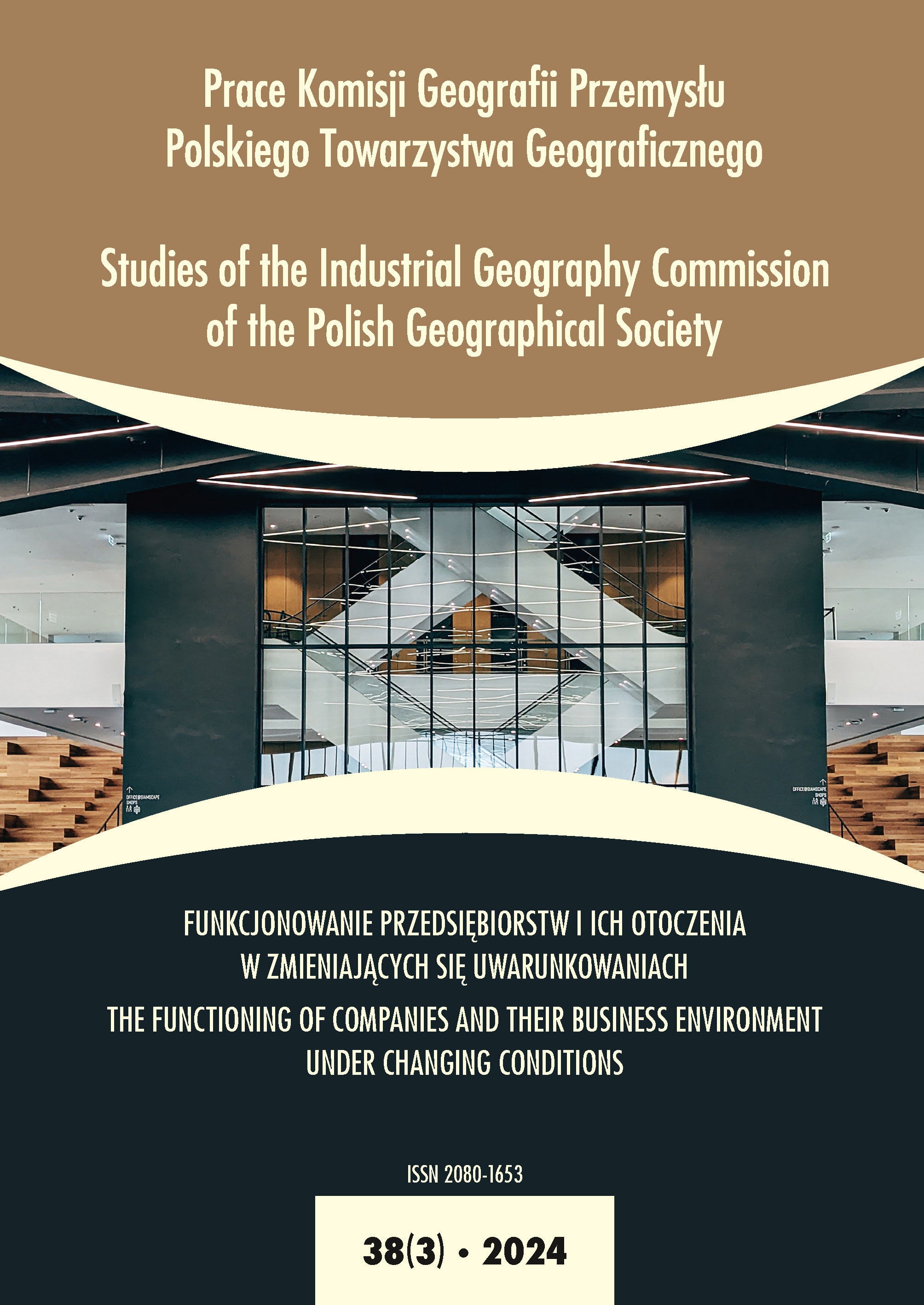Wykorzystanie organizacji III Igrzysk Europejskich do promocji Małopolski i Krakowa – na podstawie opinii respondentów
DOI:
https://doi.org/10.24917/20801653.383.6Słowa kluczowe:
Igrzyska Europejskie, Kraków, Małopolska, promocja miasta, sportAbstrakt
Celem badania było poznanie opinii respondentów na temat znaczenia III Igrzysk Europejskich w promocji turystycznej Małopolski i Krakowa. Ankietowani zostali zapytani m.in. o korzyści wynikające z przeprowadzenia tak dużej i prestiżowej imprezy sportowej w Małopolsce, o ocenę reklamy i przygotowania regionu do tego wydarzenia, a także o uczestnictwo w Igrzyskach. Badanie przeprowadzono na 100‑osobowej grupie osób za pośrednictwem formularza Google Forms, który składał się z 14 zamkniętych pytań ankietowych. Jak pokazały wyniki badań, 25% ankietowanych w ogóle nie słyszało o Igrzyskach Europejskich w Polsce, a ponad 50% nie wiedziało, jakie inwestycje są planowane w Małopolsce w związku z organizacją tej imprezy. Zdaniem respondentów Igrzyska były doskonałą okazją do promocji miasta (73%), jednak gospodarze nie przygotowali się dobrze do tego wydarzenia – niewystarczające były promocja i reklama (55%). Uczestnicy badania zauważyli, że szansa na przygotowanie tak prestiżowego wydarzenia sportowego nie została dobrze wykorzystana, a organizatorzy powinni wyciągnąć z tej sytuacji wnioski na przyszłość.
Downloads
Metrics
Bibliografia
Bączek, J.B. (2011). Psychologia eventów. Wydawnictwo Stageman Polska.
Borzyszkowski, J. (2012 a.). Mistrzostwa Europy w Piłce Nożnej UEFA EURO 2012 a turystyka w Polsce – wstępna ocena. Turystyka Kulturowa, 9, 55–68.
Borzyszkowski, J. (2012 b.). Ocena krótkotrwałych efektów organizacji mistrzostw Europy w piłce nożnej UEFA EURO 2012. Przykład rynku turystycznego Gdańska. W: A. Krakowiak, B. Stasiak (red.), Kultura i turystyka w kręgu wydarzeń. Łódź: Regionalna Organizacja Turystyczna.
Brinich, W. (2014). Igrzyska patriotów. Zimowe Igrzyska Olimpijskie w Soczi bez szkody dla przyrody? Pozyskano z: https://dzikiezycie.pl/archiwum/2014/marzec‑2014/igrzyska‑patriotow‑zimowe‑igrzyska‑olimpijskie‑w‑soczi‑bez‑szkody‑dla‑przyrody (dostęp: 10.01.2024).
Changqing, X., Wenting, D., Tengku, F., Binti Tengku, K., Normala, I., Jie, Z., Xiaoming, Y., Hua, L. (2020). The role of sports mega – events in the sustainable Development of cities: A systematic review. Malaysian Journal of Sport Science and Recreation, 19, 1, 16–36.
Florek, M., Proszowska‑Sala, A. (2002). Promocja miast. Nowa perspektywa. Warszawa: Wydawnictwo Ströer.
Gaworecki, W.W. (2003). Turystyka. Warszawa: PWE.
Gholipour, H.F., Arjomandi, A., Marsiglio, S., Foroughi, B. (2020). Is outstanding performance in sport events a driver of tourism?. Journal of Destination Marketing & Management, 18, 100507.
IOC (International Olympic Committee). (2003). Sustainable development through sport: The impact of mega-sporting events. Pozyskano z: https://stillmed.olympic.org/Documents/ Commissions_PDFfiles/SportAndEnvironment/Sustainability_Through_Sport.pdf (dostęp:
02.2024).
KRKNEWS.pl. (2023). Igrzyska Europejskie. Pozyskano z: https://krknews.pl/znamy‑budzet‑igrzysk‑europejskich/, https://www.malopolska.pl/dla‑mieszkanca/sport/igrzyska‑europejskie (dostęp: 10.01.2024).
Lee, Ch.‑K., Taylor, T. (2005). Critical refl ections on the economic impact assessment of a mega‑event: the case of 2002 FIFA World Cup. Tourism Management, 26.
Łuć, B. (2019). Wydarzenia sportowe jako narzędzie turystycznej promocji miasta. Uniwersytet Ekonomiczny w Poznaniu. W: A. Niezgoda, Ł. Nawrot (red.), Kierunki rozwoju współczesnej turystyki. Kraków: Proksenia.
Malchrowicz‑Mośko, E., Kamel, M., Poczta, J. (2016). The impact of sporting events on the image of the city – Poznań as a case study. Journal of Education, Health and Sport, 6(4), 211–232.
doi: http://doi.org/10.5281/zenodo.50118
Malchrowicz‑Mośko, E. (2015). Pozytywne oraz negatywne implikacje turystyki olimpijskiej. Turystyka Kulturowa, 8, 57.
Mierzwa, P., Bugajska, M., Raniszewski, S., Borek, D., Dróżdż, M., Tomanek, M. (2023). Management of the European Games 2023 by public administration – organizational and legal aspects.
Journal of Education, Health and Sport, 41(1), 83–107. doi: http://doi.org/10.12775/ JEHS.2023.41.01.007
Müller, M. (2015). What makes an event a mega‑event? Definitions and sizes. Leisure Studies, 34(6), 627–642.
Obserwatorium Polityki Miejskiej i Regionalnej. (2018). Wielkie wydarzenia. Szansa czy przekleństwo dla miast? Pozyskano z: https://obserwatorium.miasta.pl/opm/idea‑misja‑cele/2018 (dostęp: 10.01.2024).
Poczta, J., Malchrowicz‑Mośko, E. (2016). The impact of sporting events on tourism development in the city – the case study of Poznan. Journal of Education, Health and Sport, 6(4), 151–166. doi: http://doi.org/10.5281/zenodo.50021
Rajkiewicz, M. (2020). Igrzyska Europejskie 2023 Kraków- Małopolska. Szanse i wyzwania dla Polski. Pozyskano z: https://ine.org.pl/igrzyska‑europejskie‑2023‑krakow‑malopolska‑szanse‑i‑wyzwania‑dla‑polski/ (dostęp: 10.05.2024).
Rogala, A. (2011). Rola sportu w promocji miast. Zeszyty Naukowe Uniwersytetu Szczecińskiego, 690, 79.
Rojas‑Méndeza, J., Daviesb, G., Jamsawangc, J., Sandoval Duqued, J.L., Pipolie, G.M. (2019). Explaining the mixed outcomes from hosting major sporting events in promoting tourism. Tourism Management, 74, 300–309.
ZIEF. (2023). Igrzyska wKrakowie kosztowały krocie, ale izarabiały. „Ponad 500mln zł”. Pozyskano z:
https://przegladsportowy.onet.pl/igrzyska‑olimpijskie/igrzyska‑w‑krakowie‑kosztowaly‑krocie‑ale‑i‑zarabialy‑ponad‑500‑mln‑zl/br1j7e0 (dostęp: 05.04.2024).
Pobrania
Opublikowane
Jak cytować
Numer
Dział
Licencja
Prawa autorskie (c) 2024 Prace Komisji Geografii Przemysłu Polskiego Towarzystwa Geograficznego

Utwór dostępny jest na licencji Creative Commons Uznanie autorstwa – Bez utworów zależnych 4.0 Międzynarodowe.
Artykuły publikowane są zgodnie z warunkami licencji Creative Commons (CC BY-ND 4.0; uznanie autorstwa-bez utworów zależnych).

